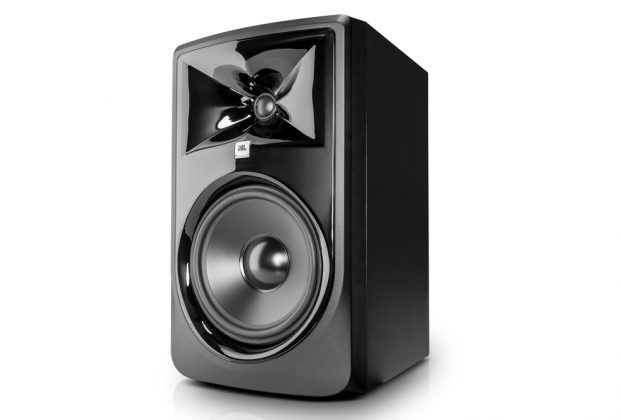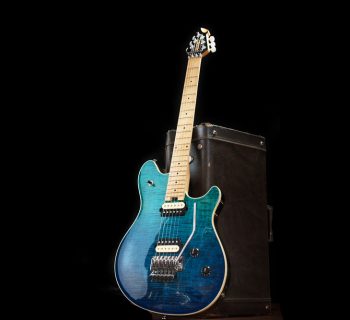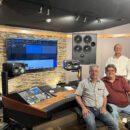The new JBL 3 Series MkII monitors are available in three versions all designed to provide a consistent sound signature in any size production room. These are two-way powered monitor speakers and the three models are: the 305P MkII (5-inch woofer), 306P MkII (6.5-inch) and 308P MkII (8-inch).
The 3 Series upgrades the original JBL 3 Series and shares design elements from JBL's flagship M2 Master Reference monitors including the Image Control Waveguide and improved tweeter and woofer transducers. The goals for the JBL 3 Series MkII are for detailed and precise stereo imaging over a wider listening area and also to improve the transient response and linearity over the original JBLs.
I received for review two 308P MkII monitors plus the companion powered subwoofer, the LSR310S with its 10-inch down-firing high excursion woofer. I wanted to compare them directly to my existing 2.1 monitor system in my Pro Tools HDX mix room--my pair has the same size woofers and I use a separate subwoofer.
I connected them up easily to my Cranesong Avocet IIa monitor controller--all these powered speakers have both -10dBv 1/4-inch and +4dBu balanced XLR input jacks plus an input sensitivity switch and smooth working level control to accommodate any system's output level.
The 3 Series have rear reflex ports so JBL uses their patented Slip Stream™ port design to improve linearity and reduce port chuffing--the noise of air rushing in and out of the port. There is an adjustable boundary equalizer to compensate for the low frequency build up when they are positioned close to walls and/or corners or operated on desktops. The boundary EQ is a low frequency shelving filter at 50Hz with 0, -1.5 and -3dB positions.
In my small room--it's only 9.5-feet wide--front or rear ported speakers make a big difference in the bass. I had to put in the -3dB position in the boundary EQ to match the bass produce by my front-ported monitors. I found the 308Ps to project out into my room more than I am used to--the stereo image was good at my normal listening position and farther back. These speakers would work great in a home theatre when sitting back on the couch!
A big difference I heard was the change of imaging between my speakers and the 308Ps. There was less of a "beaming" effect from the 308P's woven-composite one-inch Neodymium tweeters and waveguide compared to the ribbon tweeters of my monitors. I could hear detail and the various distinct pan locations even when listening off-center between the speakers. I thought I might need to boost high frequencies using the HF Trim switch because of my heavily absorption-treated room but the 0dB position (there are also -2dB and +2dB choices) worked great.
The LSR310S subwoofer plugged right into the same cables I already had set up. When all the monitors were set to +4dB, they were not as loud as my old monitors so I would just crank up the volume on the Avocet. I used the same 80Hz crossover switch position but the LSR310S also has the XLF position for 120Hz high-pass filter tuning that is used by club playback systems and more than double the bass output. Like all the monitors in the 3 Series line, the 310S has a protective limiter to allow maximum volume without damage to the drivers. Good thing as the LSR310S has a 200-watt Class-D amp that'll shake the house if you want!
The 308P is powered by two 56-watt Class-D amps--one each for the tweeter and woofer. The crossover frequency is 1800Hz and the speakers are rated at 102dB SPL measured C-weighted with pink noise.
So I am left with an overall great impression of the JBL 308P and companion LSR310s subwoofer. With the 308P each selling for $249 MSRP and the LSR310s at $399, you can have a proper 2.1 or 5.1 system for a few dollars as possible it seems. Go for it!
jblpro.com/www/products/recording-broadcast/3-series-mkii/
Barry Rudolph is a recording engineer/mixer who has worked on over 30 gold and platinum records. He has recorded and/or mixed Lynyrd Skynyrd, Hall & Oates, Pat Benatar, Rod Stewart, the Corrs and more. Barry has his own futuristic music mixing facility and loves teaching audio engineering at Musician’s Institute, Hollywood, CA. He is a lifetime Grammy-voting member of NARAS and a contributing editor for Mix Magazine. barryrudolph.com














